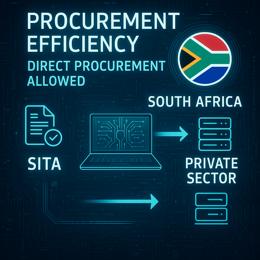Image created by AI
Unveiling the Challenges and Controversies Surrounding South Africa's New Anti-Corruption Directorate
In an era where transparency and accountability play pivotal roles in governance, South Africa's efforts to combat corruption have once again come under scrutiny. The newly proposed Investigating Directorate Against Corruption (Idac), intended to be a bastion against corruption, faces criticism for potentially being unconstitutional and mirroring the vulnerabilities that led to the disbandment of the Scorpions.
The Idac, emerging from the shadows of the Scorpions and its 2019 predecessor, purports to address the extensive corruption highlighted during the state capture inquiry. However, experts argue that Idac is shrouded in the same legislative and operational weaknesses that plagued its predecessors. Notably, despite its portrayal as an independent body, Idac remains under the National Prosecuting Authority (NPA), tethering it closely to the government structures it aims to scrutinize. This arrangement contradicts the directives laid out by the Constitutional Court, which mandates complete autonomy for anti-corruption entities from executive influence.
Further complicating matters, Idac's establishment barely alters the status quo, retaining much of the leadership and investigative personnel from prior setups. With merely 22 investigators tasked with untangling the complex web of corruption cases described by former Chief Justice Raymond Zondo as requiring "an army of prosecutors," the directorate's capacity to effect change seems minimal.
Legal challenges loom as well, with several critiques pointing out that Idac could easily be dissolved by a simple parliamentary majority, similar to the fate of the Scorpions. This lack of permanence questions the long-term viability and independence of the directorate, essential traits for any institution meant to combat corruption effectively.
Moreover, recent judicial misunderstandings and misinterpretations regarding anti-corruption legal frameworks have done little to assuage fears about the potential efficacy of Idac. The misreading of crucial judgments, such as the Glenister case, by significant figures in the justice system, including the Ministers of Justice, has led to a discord between enacted policies and the judicial directives that are supposed to guide them.
The result is a burgeoning gap between the legislative actions taken by the government and the stringent requirements laid out by international and constitutional law. This gap not only jeopardizes South Africa's efforts to escape the FATF grey list but also underscores a persistent governance issue that allows corruption to flourish.
Community and legal experts advocate for a new approach – a constitutional amendment or a new legislative framework that complies fully with judicial precedents and international treaties. They argue for a specialized, trained, and independently resourced unit, secure in its tenure and operation, to properly address and dismantle the entrenched networks of corruption.
As South Africa continues to grapple with the aftereffects of state capture, the establishment of a genuinely independent, robust, and constitutionally sound anti-corruption body remains crucial. The journey towards significant reform is fraught with challenges, but the path forward must involve rectifying the shortcomings of current initiatives like Idac. Only through true independence, adequate resourcing, and clear legislative support can South Africa hope to restore public trust and international credibility in its fight against corruption.










